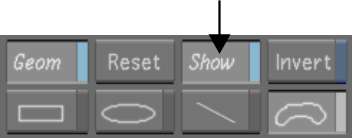You can animate the position
of geometries by defining a Point Tracker and assigning it to the
axis of the geometry.
To animate the position of a geometry
with the Point Tracker:
- In the Secondaries menu, activate the
secondary layer button that contains the geometry you want to track.
- Click Show.
- The Point Tracker option should already
be enabled by default.
NoteWhen the Diamond
Keyer is selected, disable the Show button (beneath the Source Primary
button) to display the Tracker panel.
- Enable a new tracker by clicking New.
- In the Player, go to the frame where
you want to start tracking, and then click a tracking point in the
image.
In the Player, the tracker
is assigned to, and positioned over, the tracking point. A tracker
number is assigned to the tracker and the tracker is set to On.
When a tracker is on,
it is displayed in the Player and can be analysed.
- Disable the Solo/Gang button to select
Solo mode.
In Solo mode, only the
current tracker is analysed.
- Use the Analyse buttons to analyse the
shot:
- To track the tracking point forward in
time, click the Analyse Forward buttons.
- To track the tracking point backward
in time, click the Analyse Backward buttons.
The system analyses the
image and generates tracking data. For each frame in the shot, the
position of the tracking point is displayed in the Player. The current
position of the tracking point is highlighted in magenta.
- Enable Assign.
- In the Player, click the geometry's axis.
The tracker is assigned
to the geometry's axis or vertex.
- If the tracker loses the tracking point,
click the image to stop the process, and then use the Step Backward
or Step Forward button in the Player controls (or press the right Alt or right Ctrl key, respectively) to return
to the last frame that was correctly tracked.
- In the Player, do any of the following:
- To resize the tracker, modify the Match
area (magenta rectangle) and Search area (yellow rectangle) by dragging
the vertices of the rectangles.
- To reposition the tracker, drag the centre
point of the tracker.
- To reposition the tracker and reference
point, middle-click and drag the centre point of the tracker.
TipYou can reposition
the tracker and reference point when the reference point moves off-screen.
- Continue using the Analyse buttons to
analyse the shot.
- To manually add or reposition a tracking
point, go to the frame where you want to modify the tracking data,
enable Add Key, and then click a tracking point in the image.
The position of the tracking
point is displayed in the image.
- To manually delete the position of a
tracking point, go to the frame where you want to remove the tracking
data, and then click Del Key (or press Backspace).
The tracking data is
deleted.
NoteLinear interpolation
is used to set the tracking position for frames without tracking
data. For these frames, the previous defined tracking position and
the next defined position are used to interpolate the tracking position.





![]()


![]()











